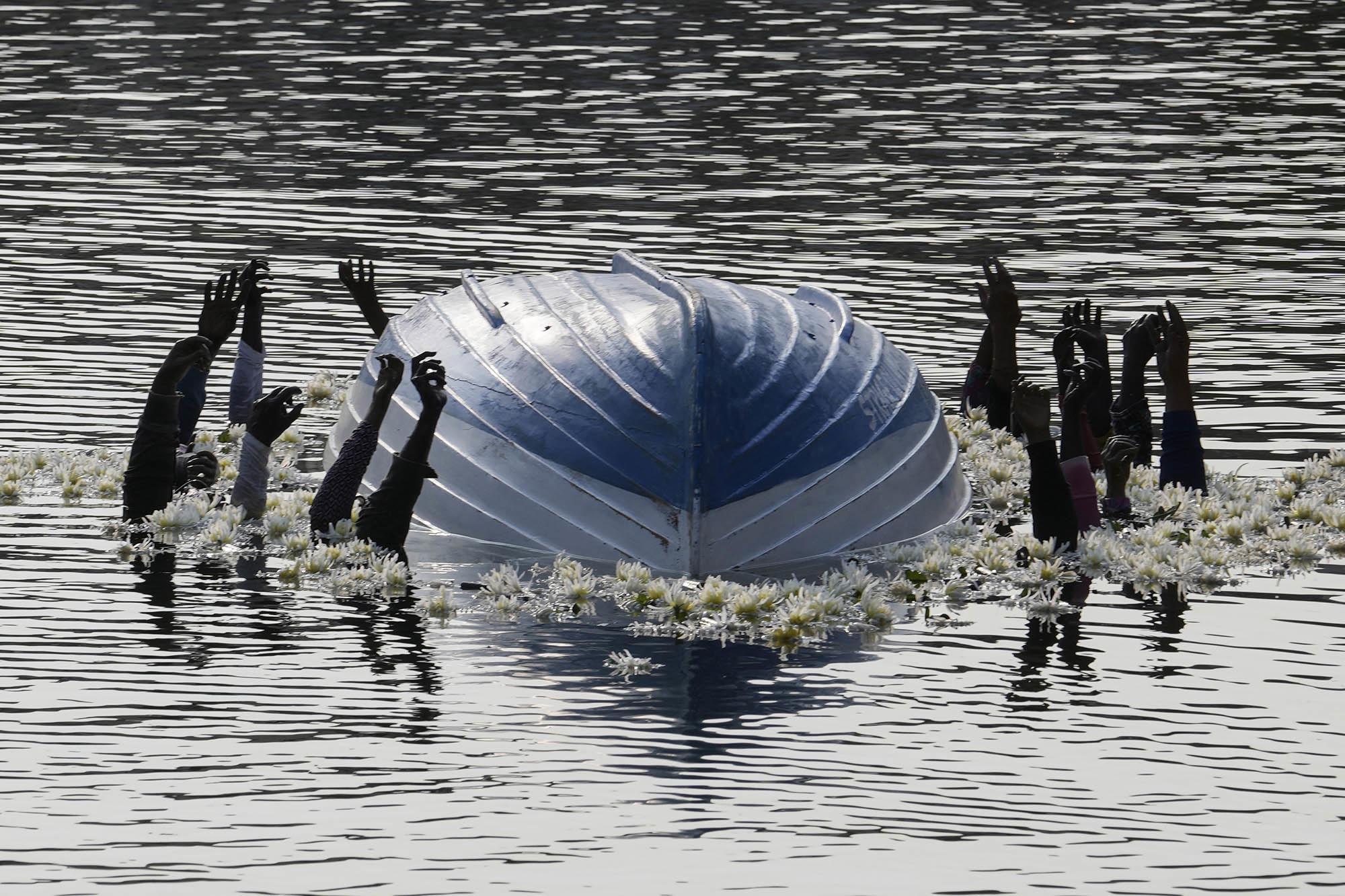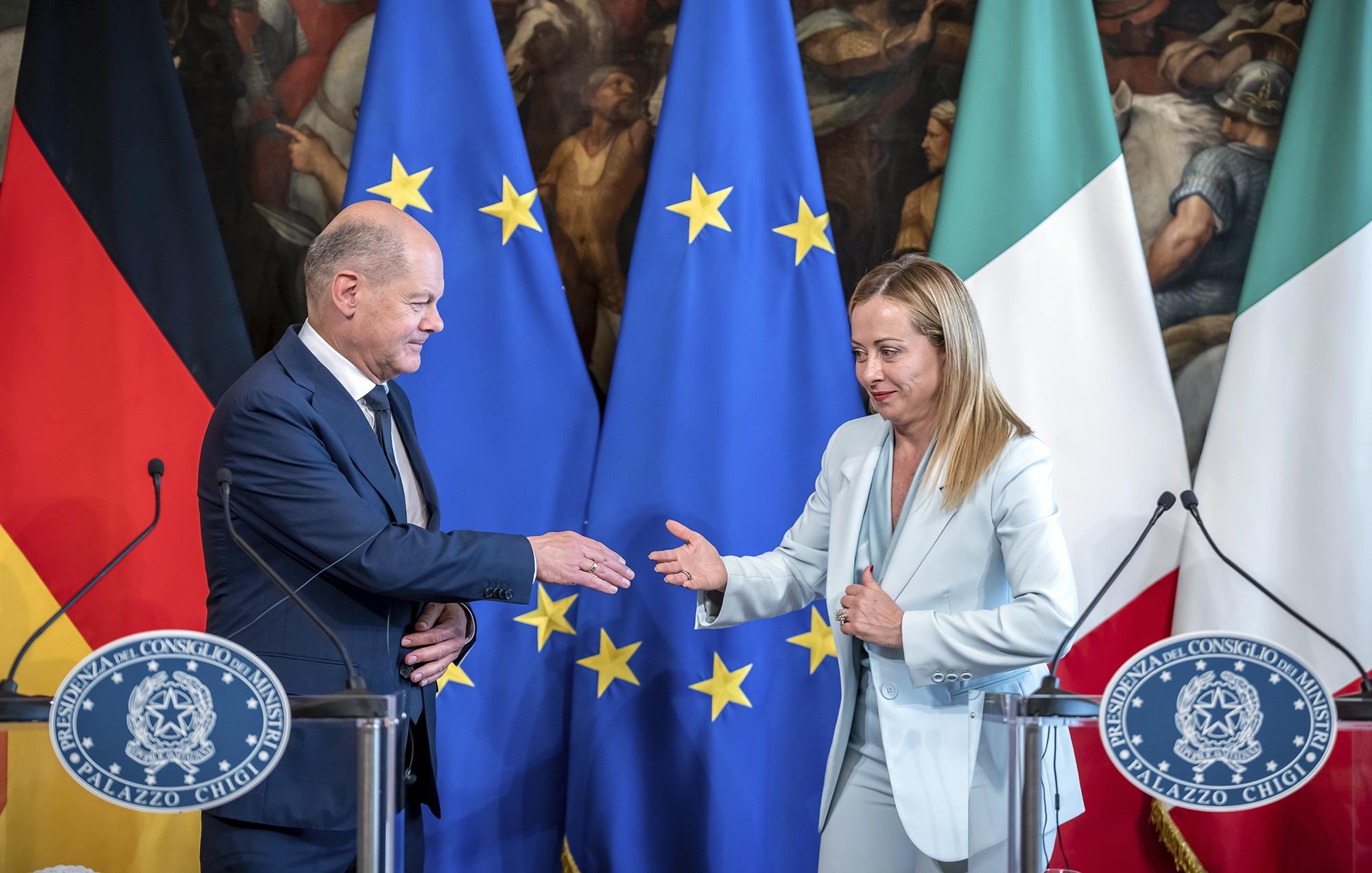Experts attribute increasing support to economic concerns, migration issues, and predict major ramifications on group's policies
 Carsten Linnemann (right), Christian Democratic Union's secretary-general, and Ottilie Klein, secretary-general of CDU Berlin, hold a campaign poster reading "Berlin, your chance. Show the traffic lights the stop sign!" in Berlin on Dec 19, 2023. (PHOTO / AP)
Carsten Linnemann (right), Christian Democratic Union's secretary-general, and Ottilie Klein, secretary-general of CDU Berlin, hold a campaign poster reading "Berlin, your chance. Show the traffic lights the stop sign!" in Berlin on Dec 19, 2023. (PHOTO / AP)
The European Union has witnessed a rapid rise of populist parties in 2023, a change that was caused largely by economic and migration issues and a change that will affect the EU's political landscape and China-EU relations, experts say.
So far, about one-third of seats in the European Parliament are occupied by parties that are viewed as populist or radical, and the trend is likely to continue in the next European elections in June.
According to research led by political scientist Matthijs Rooduijn at the University of Amsterdam, 32 percent of Europeans now vote for populist, far-right or far-left parties, compared with 20 percent in the early 2000s and 12 percent in the early 1990s.
For the first time in France, more French people say far-right leader Marine Le Pen's National Rally party, now headed by her right-hand man Jordan Bardella, is capable of participating in government than not, according to an annual survey by Le Monde and Franceinfo last month.
Just 54 percent of respondents said they disagreed with the party's ideas, the lowest since the poll first began in 1984.
A EuroTrack poll conducted by OpinionWay in November showed the National Rally would win 28 percent of the vote if the 2024 European elections were held a few days later, ahead of the 19 percent for President Emmanuel Macron's Renaissance party.
National Rally is now the largest opposition party in the National Assembly, the lower house of the French parliament. The party got 89 seats in the 577-member parliament in the 2022 election, up from a previous total of only eight.
On Dec 20, Le Pen claimed an "ideological victory" after Macron's government reached a compromise over an immigration bill, a bill that divided Macron's centrist coalition but echoed Le Pen's tougher immigration policies, such as excluding foreigners from state benefits and council housing.
In Germany, the Alternative for Germany, or AfD, regarded as a far-right party in Europe, won its first mayoral election in December in Pirna, Saxony, a victory that party co-chair Alice Weidel described as "historic".
The victory has also been seen across Germany as a sign for key state and local elections in this coming year.
In June, AfD leapfrogged to surpass Chancellor Olaf Scholz's Social Democrats, or SPD, to become the second-largest party in Germany, behind former chancellor Angela Merkel's Christian Democratic Union.
A Forsa poll on Dec 19 showed that AfD received a record high of 23 percent of support, behind the 31 percent for CDU but way ahead of the 14 percent for SPD, 13 percent for the Greens and 5 percent for the Free Democrats.
 An installation in Milan, Italy, is displayed at the Darsena del Naviglio canal on Oct 5, 2023 in memory of a fishing boat packed with about 500 African migrants which capsized in 2013 off the shores of the Sicilian island of Lampedusa. (PHOTO / AP)
An installation in Milan, Italy, is displayed at the Darsena del Naviglio canal on Oct 5, 2023 in memory of a fishing boat packed with about 500 African migrants which capsized in 2013 off the shores of the Sicilian island of Lampedusa. (PHOTO / AP)
After major election victories in the states of Hesse and Bavaria in October, Weidel said AfD is "no longer an eastern phenomenon, but has become a major all-German party".
"So, we have arrived," she said, referring to the party's high popularity in former East Germany's states.
In Italy, Prime Minister Giorgia Meloni worried many after she took power in October 2022 because of her Brothers of Italy party's reputation as a post-fascist party. But so far, her coalition has been widely viewed as right-wing on domestic policies, such as family, civil rights and immigration, but moderate on international relations and some EU affairs.
"Since becoming Italy's prime minister, Giorgia Meloni has been something of a surprise for Brussels-based skeptics," Anthony Constantini, who studied populism at the University of Vienna, wrote in an opinion piece for the Politico website.
"As leader of the post-fascist Brothers of Italy, many had expected her to be a firebrand a la Hungary's Viktor Orban. But she has instead sought a different goal: to become the first populist-right leader to forge a genuine Pan-European alliance.
"And if she's successful, it could change the game in Brussels forever."
Besides the EU's three biggest economies, populist leaders have also claimed election victories and gained popularity in the past year in Austria, the Netherlands, Slovakia, Sweden and several other EU states.
Yan Shaohua, an associate professor in the Institute of International Studies at Fudan University in Shanghai, said the rise of the far right, including in core EU countries such as France, Germany and Italy, is largely associated with the persisting migration crisis that has worsened over the past years because of heightened geopolitical tensions in the EU's neighborhood, particularly in Ukraine and the Middle East.
"With an election year coming in 2024, the rise of far-right populism is expected to further transform the EU's political landscape that has been increasingly fragmented and polarized over the years," he said.
Yan said he believes the far rights' anti-immigration stance and nationalist rhetoric will pose serious challenges to the EU's established policies in areas of migration, internal reform and support for Ukraine.
 German Chancellor Olaf Scholz (left) attends a news conference with Giorgia Meloni, prime minister of Italy, after talks that focused on issues of European security, migration and the future of the European Union in Rome, Italy, on June 8, 2023. (PHOTO / AP)
German Chancellor Olaf Scholz (left) attends a news conference with Giorgia Meloni, prime minister of Italy, after talks that focused on issues of European security, migration and the future of the European Union in Rome, Italy, on June 8, 2023. (PHOTO / AP)
'More pragmatic' approach
"For China-EU relations, the picture will be a mixed one. While the rise of right-wing populism has led some EU member states to take a more pragmatic approach toward China, such as Hungary's Eastern Opening policy, it could also push some countries to take a tougher approach in different sectors," he said.
He Zhigao, a researcher at the Institute of European Studies at the Chinese Academy of Social Sciences, said he believes the rise of populism in Europe is caused by the growing division among member states during globalization and EU integration as well as the resistance to elite politics.
"They support political and economic protectionism … and on the other hand, the frequent transfer of power in some countries means a lack of consistent policy on China, making the relationship more complex and challenging," he said.
But he said he believes it still will not change the fundamental landscape of "mutually beneficial win-win cooperation" between China and the EU.


